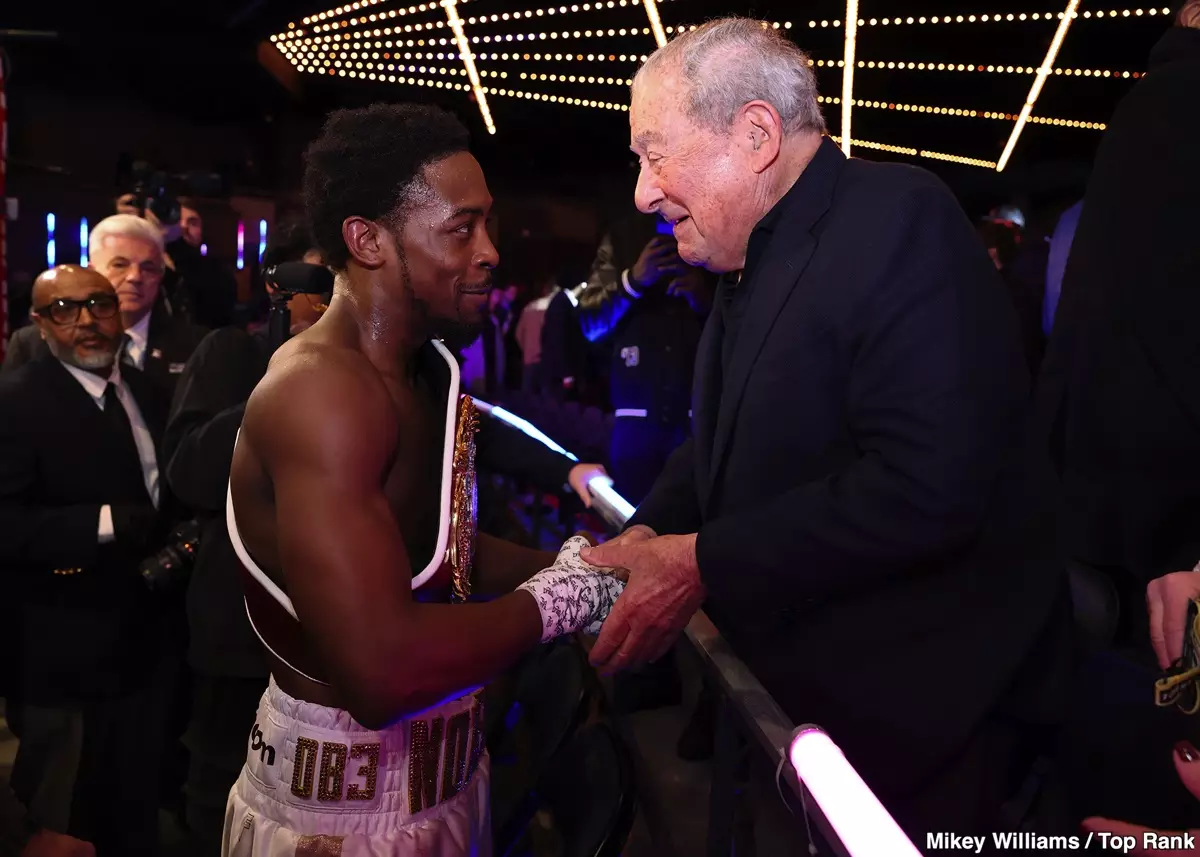Keyshawn Davis made headlines last Friday night after capturing the WBO lightweight title by defeating Denys Berinchyk with a fourth-round knockout at Madison Square Garden. While many heralded this victory as a milestone achievement for the 2020 Olympic silver medalist, a closer examination of his career choices raises questions about his ambition and risk appetite in a sport known for its fierce competition.
Winning a world title is undeniably an impressive accomplishment in boxing, and Davis’s victory over Berinchyk has solidified his place among rising talents in the division. However, one has to ponder whether this triumph truly reflects his potential or simply represents a departure from what previous champions would have considered sufficient. Davis’s decision to fight Berinchyk—whom many perceive as a more manageable opponent—serves to illustrate a worrying trend: the inclination to select less formidable challenges. This cautious approach differentiates him from past boxing legends, who often took on high-stakes bouts early in their careers.
Davis’s evident reluctance to step up against formidable opponents is concerning. His refusal to engage in bouts against rising stars such as Andy Cruz indicates a reluctance to face challenges that could potentially elevate his status. In stark contrast, fighters like Sugar Ray Leonard and Tommy Hearns readily embraced risk, frequently squaring off against elite competitors. This crucial aspect raises doubts about whether Davis is truly ready to claim the title of future face of boxing or simply content with holding a title without facing the elite of the sport.
Reflecting on his career trajectory, Davis appears to have established a comfort zone at lightweight. Remaining within this division, he has faced seemingly less daunting opponents, such as Miguel Madueno and Jose Pedraza. The pursuit of titles within a specific weight class, contrasted with the confrontations of champions past, reveals a certain unease in Davis’s approach to his burgeoning career. While many fans and analysts continue to herald him as the next big star—one who possesses the charisma, skill, and looks necessary to thrive in boxing—there’s a growing conviction that he may be following the path laid by fighters who prioritize financial gains over a lasting legacy.
One cannot ignore the striking comparison between Davis and Adrien Broner, another fighter who garnered attention by selecting manageable opponents and generating hype through charismatic, often polarizing, public persona. The similarities in their fight strategies and promotion techniques add to the skepticism regarding Davis’s career intentions. Both fighters carved out reputations based on effective marketing rather than fierce in-ring competition.
Davis’s continued presence at lightweight presents further conundrums. As he grows physically, some boxing experts speculate that he will likely outgrow the division, leaving him at a crossroads. The prospect of taking on elite fighters such as Gervonta Davis or Vasily Lomachenko remains a far-fetched dream unless he decides to step outside the comfort of handpicked opponents. The hesitance to pursue these high-risk, high-reward bouts threatens his reputation and his standing as an emerging boxing superstar.
Moreover, moving up to 140 pounds presents its own challenges. The division currently features names like Teofimo Lopez, but Davis’s lack of that level of aggressiveness in seeking out competitive bouts raises eyebrows. Without proactive engagement in these higher-stakes matchups, one can’t help but speculate whether Davis is genuinely focused on his legacy or simply looking to ride the wave of easy victories.
Throughout the chatter surrounding Davis’s aspirations, one sentiment rings clear: he’s emphatic about his desire to make money. By dubbing himself “The Businessman,” Davis embodies the modern fighter’s mentality, prioritizing financial security over the legacy crafting that characterized previous generations of boxers. With promotional support from Top Rank, it seems Davis is keen on pursuing a blueprint focused on monetary success rather than formidable competition. This raises the question of whether Davis’s approach could redefine what it means to be a successful boxer, albeit at the potential cost of losing respect in a sport that values courage and legacy.
While Davis’s boxing accolades are significant, they warrant cautious admiration due to the trajectory he appears to be following. The burden of legacy weighs heavily in a sport where true greatness demands more than just titles; it requires risk, courage, and unwavering determination to face challengers. As boxing fans eagerly await the next steps in Davis’s career, they can only hope that he chooses a path reflective of ambition rather than simply ensuring financial gain. If not, he risks becoming just another fleeting name in a sport that celebrates true warriors.

